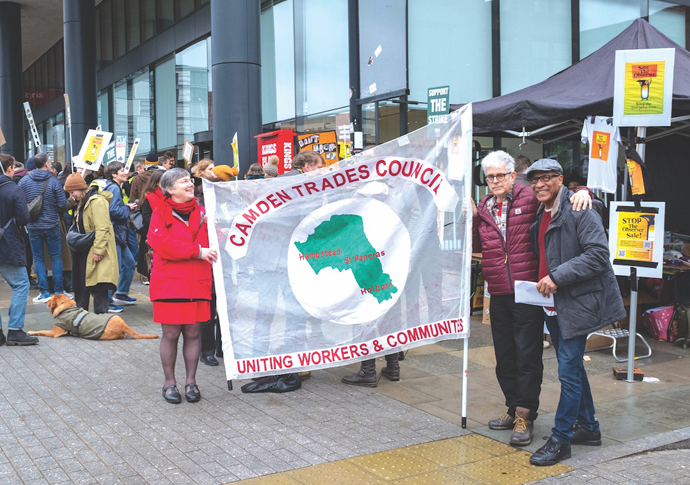Battle at liberal journalism’s beacon
Camden Trades Council Co-chair George Binette sketches the background to a bitter fight about the future of legendary national newspapers
Friday, 31st January 2025 — By George Binette

Camden Trades Council delegation joins striking journalists at Guardian HQ
OVER four December days scores of Guardian and Observer journalists carried placards and chanted slogans.
The unlikely union militants mingled with the likes of Billy Bragg, legendary publisher Margaret Busby, Grayson Perry, Stewart Lee and Anne Robinson as well as the odd MP such as John McDonnell on the Camden-Islington boundary outside King’s Place, York Way.
For the first time since the early 1970s, members of the National Union of Journalists (NUJ) had walked out at the Guardian, long seen as Britain’s most liberal daily publication and an all too rare mainstream platform for socialist arguments.
In mid-January Camden Trades Council delegates met with Dan Kuper, Deputy Father of the NUJ Chapel, and his Unite union counterpart John Stuttle, who provided a detailed overview of the ongoing dispute with senior management, which had led colleagues to vote overwhelmingly (93 per cent) for strike action and join picket lines.
The immediate trigger came last September when news emerged of plans to offload The Observer to a loss-making digital start-up, Tortoise Media, known primarily as a podcaster.
The Guardian Media Group (GMG), part of the Scott Trust established in 1907 ostensibly to preserve The Manchester Guardian’s editorial independence, purchased The Observer in 1993.
At the time, the world’s first Sunday newspaper had teetered on the brink of bankruptcy.
Midst the sharp decline of print journalism globally in the last three decades both titles have survived with the Guardian’s online operation achieving success in the US and to a lesser extent Australia.
While GMG had treated the Sunday title as something of a poor relation, denying The Observer a distinct online presence, some analysts believe The Observer had contributed a net surplus to GMG’s coffers in the past year.
Whatever the precise financial details, the decision to sell the paper to Tortoise Media seemed curious to say the least. Since its emergence in 2018, the company set up by former BBC News director and Times editor, James Harding, Tortoise has failed to break even.
Its losses in the last financial year approached £3million – admittedly an improvement on £4.6million the year before.
Despite obvious concerns about Tortoise’s viability, GMG bosses green-lit the sale in late December.
They have effectively taken a 9 per cent stake in the company that had supposedly bought The Observer based on its pledge to invest £20 million in the title over a five-year period. Union activists believe that GMG essentially gave £5million to Tortoise to “buy” The Observer. NUJ members voted heavily in favour of a “no confidence” motion against the leadership of the Scott Trust, which according to Dan Kuper sits atop “an ever-growing fund,” valued at more than £1.3billion.
There is also widespread mistrust of Guardian editor-in-chief, Katharine Viner, who assumed the post nearly a decade ago, ironically with the backing of the NUJ chapel.
She appears to have reneged on pledges to transparent management, having kept staff in the dark about talks with Tortoise and having failed to disclose a close friendship with Tortoise founder James Harding.
In addition, Viner stands accused of authorising the use of AI as a tool for writing headlines in order to undermine the effectiveness of the journalists’ strike.
Barring any legal challenge, the immediate battle over ownership of The Observer is now over.
But critical issues remain unresolved for more than 70 of the paper’s current staff along with some 40 freelancers, who face a choice between voluntary redundancy or mounting insecurity at a publication likely to shift further right in its editorial stance.
Union representatives also suspect that the latest developments with The Observer presage an attack on the NUJ’s house agreement at The Guardian, which has offered a guarantee against compulsory redundancies.
Union membership and organisation across print media have taken a battering in the nearly three decades since Rupert Murdoch’s triumph in the 1986-87 Wapping dispute. Whether the current battle at GMG heralds a potential revival or a last hurrah for the NUJ at its largest chapel remains to be seen, but for trades councils in Camden and Islington the journalists and production workers at Kings Place deserve concrete support from the wider trade union movement in the event of further strike action.
Camden Trades Council will hold a stall near the recently reopened Kentish Town station on Saturday February 15 from 11am as part of the TUC’s “HEARTUNIONS” week.
• Unite has ended its dispute after several days of talks at ACAS, but NUJ members are still locked in dispute over the governance of the Scott Trust and will be boycotting further trials of AI after management broke previous commitments during December’s strike action.